By David Milliken and Jemima Kelly
LONDON (Reuters) - The United States urged European negotiators not to miscalculate as they try to negotiate a debt deal with Greece's cash-strapped government, because the cost of a Greek exit from the euro zone was impossible to predict exactly.
U.S. Treasury Secretary Jack Lew issued the warning on Wednesday in a stopover in London on his way to a meeting of Group of Seven finance ministers in Dresden, Germany.
"My concern is not the good will of the parties -- I don't think anyone wants this to blow up -- but ... a miscalculation could lead to a crisis that would be potentially very damaging," Lew told students at the London School of Economics.
Finance ministers from the United States, Japan, Germany, France, Italy, Britain and Canada are meeting in Dresden on Thursday and Friday, and although Greece is not formally on the agenda, it is likely to be discussed on the sidelines.
Greece's government has said it does not have enough money to repay loans from the International Monetary Fund without further help from Europe. A default could lead to a chain of events that might rapidly lead to Greece leaving the euro zone.
While most Greek debt is now owned by public institutions rather than commercial banks -- reducing the risk of a banking run in case of default -- Lew urged against complacency.
"The notion that the risk is completely contained, that there's no contagion -- I think that it's a mistake to think that a failure is of no consequence outside of Greece. We don't know the exact scope," he said.
Greece itself needed to pursue reforms which any government would find hard, and foreign negotiators should be flexible, Lew added. But further support for Greece is unpopular with the public in many euro zone countries such as Germany, especially as the current Greek government has reversed previous reforms.
Lew's office said he spoke earlier on Wednesday with Greek Prime Minister Alexis Tsipras and urged him to find common ground with European Union and IMF negotiators.
YUAN FLEXIBILITY
Lew was cautious about an IMF announcement on Tuesday that the yuan
Lew said it was too early to say if China had permanently changed its ways, and that the IMF may be unable to reach a decision this year and add the yuan to the basket of currencies like the dollar that form its internal currency, the SDR.
"The standard has to be what will they do when there's pressure on the (yuan). For competitive purposes, will they continue to refrain from intervention. And ... are they truly committed to having a market-determined exchange rate?"
Addressing the U.S. economy, Lew said weak growth in the first three months of the year had been an anomaly, and that he expected the second half to be stronger.
Asked about the prospect of the U.S. Federal Reserve raising interest rates, he said central banks needed to communicate their intentions clearly.

Bond markets have been volatile in recent weeks as well as last year, which traders partly attribute to uncertainty about when the United States will start to raise interest rates.